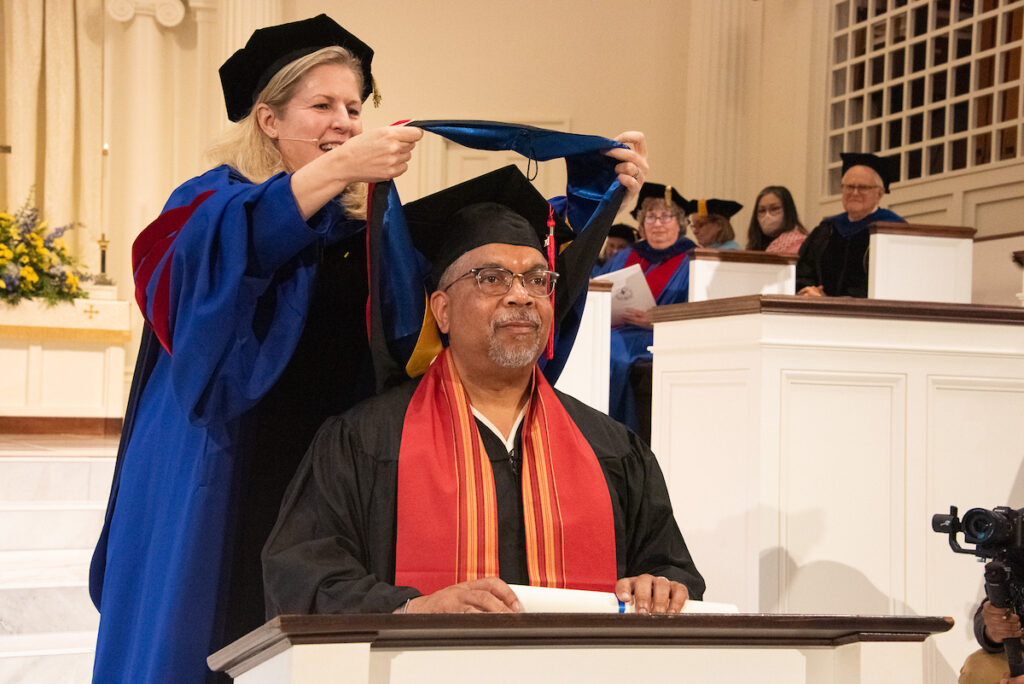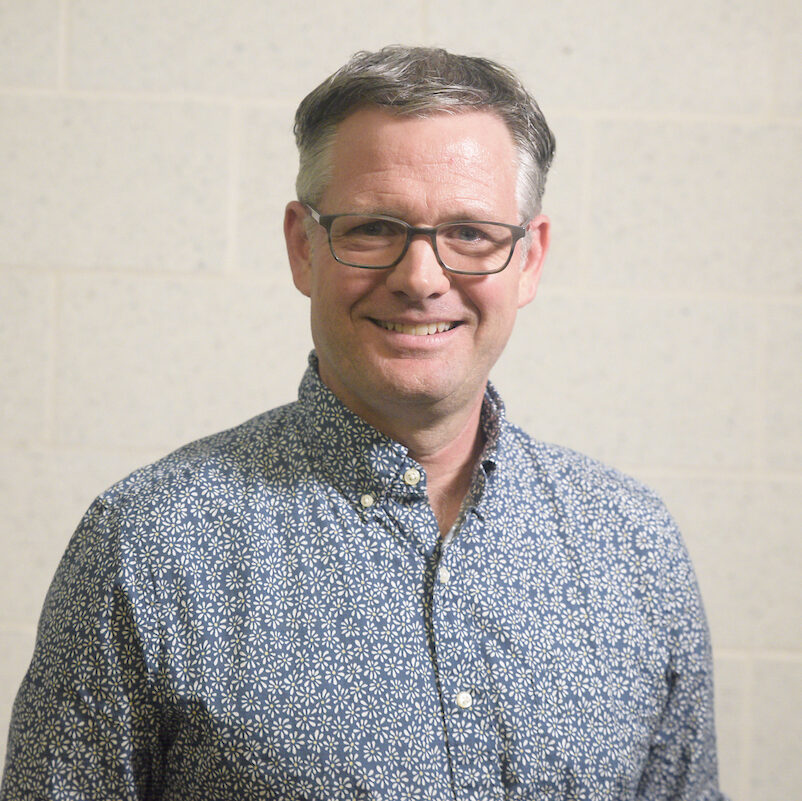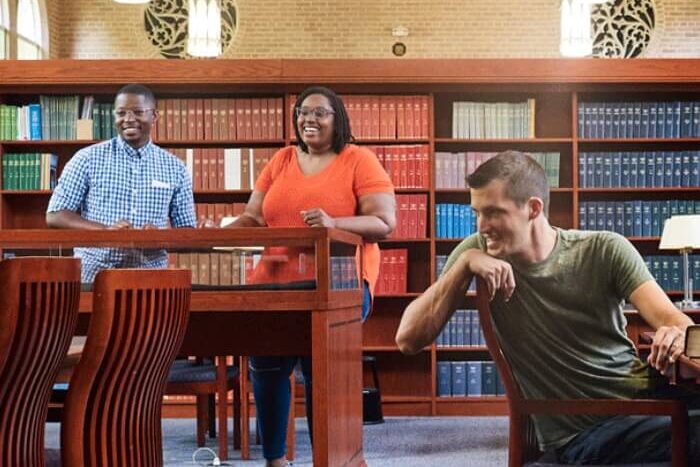Hero background image default
The Master of Arts (Theological Studies) (MA[TS]) is a flexible theological degree program for those who are preparing for doctoral studies, Church, or non-profit leadership positions, or specialized forms of ministry. The MA(TS) is helpful for anyone who wishes to engage in theological issues of faith and the modern world in relation to their current professions. While not designed to prepare persons for ordained ministry, the MA(TS) may be useful for those ministers who serve in traditions that do not require an MDiv for ordination and who nevertheless seek to deepen their knowledge of theological studies.
MA(TS) Areas of Concentration

Two Years of Customizable Learning
The MA(TS) program offers two broad areas of concentration, each of which features world-class faculty. Over the span of two years, MA(TS) students have the opportunity to take courses from faculty members with diverse research interests and denominational affiliations.
Below you will find sample courses within each concentration, as well as the associated core faculty.
Sample Courses
In a time of polarizing division in American culture, the possibility of mutual dialogue and understanding might seem like an impossible dream. Contrary to popular opinion, however, the Bible is itself a braided tapestry of differing perspectives preserved for critical dialogue and praxis. Participants will explore the rich theological diversity of the Hebrew Scriptures dialogically from Genesis to the Psalms and the Wisdom literature. In so doing, participants may discover ways to host genuine dialogue within their own communities in such a time as this.
Participants will explore the ever-shifting contours of “beauty” and “creativity” in the Old Testament by bringing various biblical texts into conversation with various artistic media, from ancient iconography to modern visual arts, music, poetry, etc. In so doing, participants will develop their own critical creativity in interpreting texts.
Participants read selected Gospel texts in their first-century colonial contexts and examines how they have been used to justify oppressive agendas such as the colonial enterprise of the 18th, 19th, and 20th centuries as well as neocolonial structures in various contemporary domains. Students explore interpretive strategies for reclaiming Gospel texts for liberative purposes.
The historical-political context in which Jesus lived and the biblical writers wrote was the Roman Empire, and Rome was an ancient slave society in which slavery was a pervasive reality. The course will explore slavery under the Roman Empire as a significant context for critically reading certain New Testament texts. How can Roman slavery help us understand certain NT texts? And what might the NT reveal about slavery and its authors? Focused attention will be on Philemon, 1 Corinthians, Galatians and the Gospels. The course will compare ancient Roman slavery with slavery in the antebellum South, observing the similarities and differences. The continuities allow students to place NT texts in conversation with antebellum texts and to imaginatively fill gaps in the former. Spiritual slave narratives and other historical documents demonstrate how slave masters used the NT to support slavery and how enslaved and freed Africans interpreted NT scripture based on their own experiences.
E.g., Prophetic Literature, Genesis, John, and the Parables of Jesus
Core Faculty
This course focuses on the ways in which a diverse array of Christian individuals, congregations, and institutions across U.S. history understood race and privilege, perpetuated or opposed racial discrimination, and pursued reconciliation through careful study of primary sources, scholarly interpretations of American religion, and the work of critical race theorists.
Investigates the unity and diversity of perspectives on Jesus Christ from a variety of social, political, and cultural contexts around the world. The challenges and opportunities of cross-cultural theological conversations are explored in light of the mixed legacy of colonial missions. Connections between Christological models and contextual religious practices are highlighted. Fulfills the MDiv World Christianities distribution requirement.
This course explores the theologies that underlie Christian notions of embodiment, desire, and sexual activity and attempts to connect those theological notions to contemporary issues of sexuality that confront the Church.
Katie Cannon states that the Black women’s literary tradition is a source of moral wisdom in the Black community. By engaging this tradition, we learn how Black women create value patterns and ethical procedures in/on their terms through creative agency. To this end, this class explores the literature and essays of Toni Morrison to reveal the moral wisdom that forms the moral theological worlds of Black women and people.
Does God act in the world? And why is there so much suffering? No two sets of questions seem more impervious to human thought or more important to life and ministry. They are also the guiding questions of the class.
Core Faculty

MA(TS) Lead Professor
Associate Professor of Theology
Requirements (15 credit hours)
Concentration Courses (15 credits)
Electives (18 credits)
How long does the MA(TS) take to complete?
Students typically take two years to complete the MA(TS), but can take up to three years to complete the degree.
How much does an MA(TS) cost?
Columbia is invested in making theological education affordable. Students who take a full course load in the fall and spring semesters (i.e., 9 credit hours each semester) receive 100% tuition coverage. Beyond this, students are responsible for purchasing books, paying activity fees ($ … each semester), insurance costs, and the regular costs of living (i.e., room and board). 20% of our students receive scholarships. Some of these cover the student activities fees, while others cover room and board and an additional stipend. See… for more information. All students who complete their application by January 15 are considered for Columbia scholarships.
Can I do this degree online?
While Columbia offers a limited number of courses online, students will take the majority of the courses necessary to meet the degree requirements in person. Recognizing the many demands on current students, Columbia has set up a schedule that allows students (who stay on schedule) to complete their degree requirements by coming to campus just two days a week. Students who want more options can spread their courses out throughout the week.
What does a typical week at Columbia look like for a student?
Students typically take 4 courses a semester, which means they spend 12 hours a week in coursework (usually on campus). Students spend an additional 9 hours per course on preparations (e.g., reading) and assignments (e.g., writing essays, engaging in group work or creative projects). Some students spend this time in the library, while others prefer to study at home, in the student lounge (called the Space), or someplace else on Columbia’s beautiful campus. Beyond these course requirements, students are also encouraged to engage in community conversations (called Forum), bi-weekly chapel services, and a variety of activities and outings planned by Student Formation and Campus Culture. Columbia offers a free lunch to students every weekday at 12:30 PM. This is an opportunity for students to spend time together over a shared meal with fellow students as well as staff and faculty. Columbia is invested in community formation, strong in the belief that learning is not a solo activity. Indeed, students often find they learn as much from interacting with their fellow students as they do from the faculty.
Can I work next to this degree program?
While many of our students work alongside their degree program, it is not advisable to engage in full-time work alongside a full-time degree program. Many of our students, however, successfully engage in part-time work next to their degree program, whether that be on campus, in a ministry setting, or in a different setting.
Can I live on campus?
Yes! Columbia has several housing options available at different and competitive price points. Columbia offers housing for both families and couples. Single students can opt to live in single-unit dwellings or in shared living spaces with fellow students. Beyond housing, Columbia also offers its residential students access to a well-equipped gym, a common space with a large kitchen and ping pong and pool tables, as well as a community garden. Students often host community events or spend time with each other in these spaces.
Get in touch with our Enrollment Management and Vocational Outreach Team for more information. You can reach us at admissions@ctsnet.edu.

©2023 Columbia Theological Seminary
Popular Topics